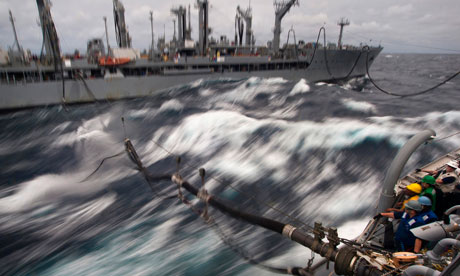 |
| The USNS Henry J Kaiseris refueled at sea on its way to international maritime warfare manoeuvres in the Pacific. Photograph: James R. Evans/U.S. Navy |
A US Navy oiler slipped away from a fuel depot on the Puget Sound in Washington state last week, headed toward the central Pacific and into the storm over the Pentagon's controversial green fuels initiative.
In its tanks, the USNS Henry J Kaiser carried nearly 900,000 gallons of biofuel blended with petroleum to power the cruisers, destroyers and fighter jets of what the Navy has taken to calling the "great green fleet,"the first carrier strike group to be powered largely by alternative fuels.
Conventionally powered ships and aircraft in the strike group will burn the blend in an operational setting for the first time this month during the 20-nation Rim of the Pacific exercise, the largest annual international maritime warfare manoeuvres. The six-week exercise began on Friday.
The Pentagon hopes it can prove the Navy looks as impressive burning fuel squeezed from seeds, algae and chicken fat as it does using petroleum.
But the demonstration, years in the making, may be a Pyrrhic victory.
Some Republican lawmakers have seized on the fuel's price, which is $26 a gallon compared to $3.60 for conventional fuel. They paint the programme as a waste of precious funds at a time when the US government's budget remains severely strained, the Pentagon is facing cuts and energy companies are finding big quantities of oil and gas in the United States.
Navy Secretary Ray Mabus, the programme's biggest public booster, calls it vital for the military's energy security.
But to Barack Obama's critics, it is an opportunity to accuse the US president of pushing green energy policies even if they don't make economic sense. The bankruptcy of government-funded solar panel maker Solyndra last year was a previous example of that, they say.
The US Defense, Energy and Agriculture departments are jointly sponsoring a half-a-billion-dollar initiative to foster a competitive biofuelsindustry. Mabus and his counterparts at the departments of energy and agriculture are due to announce new investments in biofuels industry on Monday.
Senator John McCain, the top Republican on the Senate Armed Services Committee, expressed outrage over the costs of the fuel at a hearing earlier this year.
"I don't believe it's the job of the Navy to be involved in building ... new technologies," he said. "I don't believe we can afford it."
The biofuels effort is one of the most ambitious Pentagon energy programmes since then-Defense Secretary Donald Rumsfeld set up a task force in 2006 to find ways to reduce the military's fossil fuelsdependency, involving more than 300,000 barrels a day.
"The reason we're doing this is that we simply buy too many fossil fuels from either actually or potentially volatile places on earth," Mabus told a conference on climate and security last month.
He says the Pentagon can use its buying muscle - it is the largest single consumer of petroleum in the world - to guarantee the demand needed for biofuel businesses to produce at a scale that will eventually drive down costs.
"We use 2% of all the fossil fuels that the United States uses," Mabus told the conference. "And one of the things that this means is that we can bring the market. And to paraphrase the old Field of Dreams line, if the Navy comes, they will build it."
Mabus, a former Mississippi governor and ambassador to Saudi Arabia, aims for biofuels to supply about half of the Navy's non-nuclear fuel needs by 2020, about 8m barrels a year.



0 comments:
Post a Comment